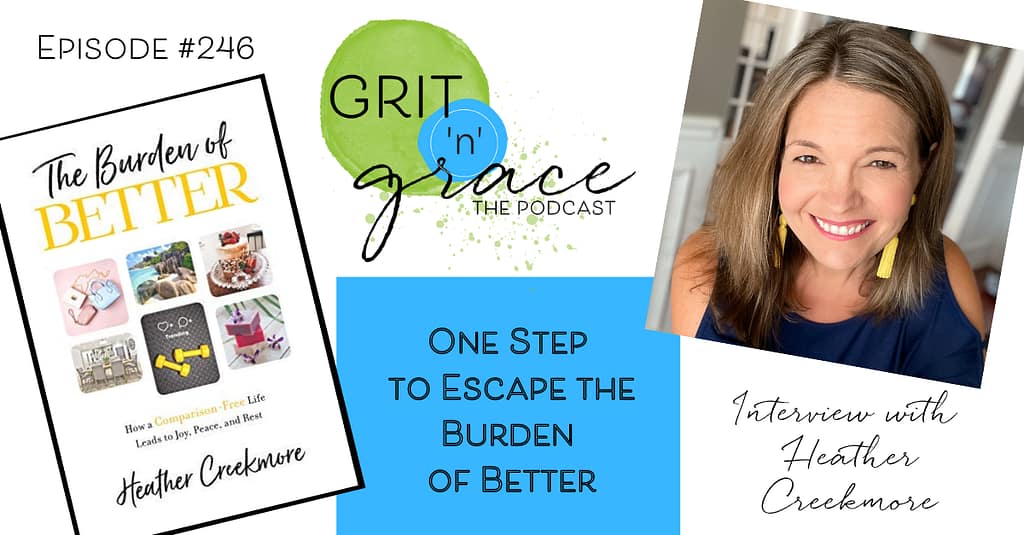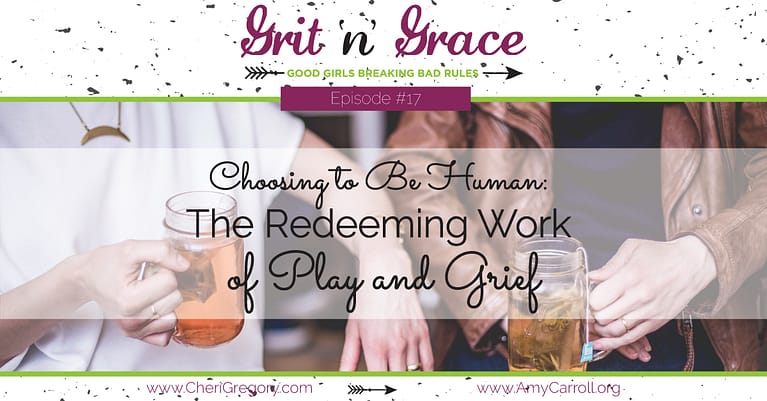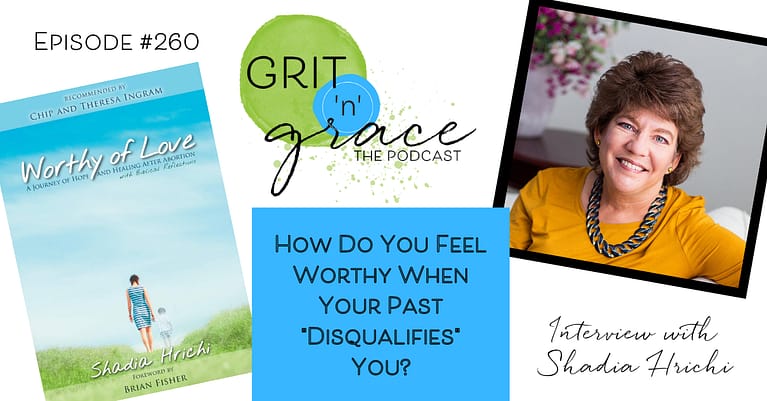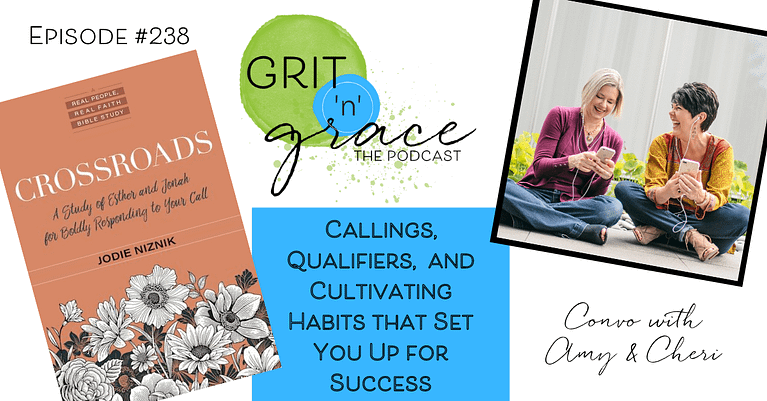Comparison. It’s so easy to slip into it. Before we’re even aware, we want her story, her talents, or her body. The lines between healthy growth and the obsessive pursuit of better get blurred, and we’re back in the comparison trap, stripped of joy and feeling less than. Heather Creekmore, author of The Burden of Better: How a Comparison-Free Life Leads to Joy, Peace, and Rest, gives us one sure step out of the destructive habit of comparison. Listen in today to receive the gift we all want!
(This page contains affiliate links. Your clicks and purchases help support Grit 'n' Grace at no extra charge to you.)
Recommended Resources
- Blog post from Heather: “Worshipping Calves — What the Old Testament Can Teach Us About Body Image“
- Blog post from Heather: “Should You Keep Trying to Be Your Ideal Self?“
- Heather’s website — www.comparedtowho.me
Your Turn
- What is your default comparison- job, gifts, parenting, marriage, clothing size?
- How does calling “comparison” “covetousness” change the way you view it?
- How would grace help you to stop comparing in this area?
Downloads
Featured Guest — Heather Creekmore

Heather Creekmore writes and speaks hope to thousands of women each week inspiring them to stop comparing and start living.
Heather’s first book Compared to Who? encourages women to uncover the spiritual root of body image issues and find freedom.
Heather’s newest release, The Burden of Better, offers women a journey into the depths of God’s grace to find a way off the treadmill of constant comparison.
Heather has been featured on national media, including Fox News, Huff Post, Morning Dose, but is best recognized from her appearance on the Netflix hit show, Nailed It. Heather and her fighter-pilot-turned-pastor husband, Eric have four children and live in Austin, Texas.
You can connect with Heather at her website, via Instagram, and on Facebook!
Transcript — scroll to read here (or download above)
****
Grit ‘n’ Grace — The Podcast
Episode #246: One Step to Escape the Burden of Better
Amy Carroll
Heather, we’re so excited to talk with you about The Burden of Better. So tell us how you came to write this book. And please unpack the title for us. What do you mean that there’s a ‘burden to better?’
Heather Creekmore
Absolutely, Amy. Well, I’m excited to be with you all. So my first book was all about body image. And my readers were like, ‘Okay, we’ve got the body image thing down. But we’re still comparing our lives to the lives of other people in all these other ways. Can you write us a book on that?’ And I was like, ‘Sure… do I know how to stop comparing?’ So I really had to seek God and say, ‘Okay, God, if there’s an answer for this thing that I’ve been missing, I need it now.’
And through writing the book, the message that just kept coming over and over again to the surface, was for me and for others, it’s this pursuit of better, this chasing something better. It’s an elusive pursuit, right? Because better is a comparative adjective: you can only have better when compared to something else. Right? So in this pursuit of better, we were staying stuck in comparison, and really missing so much that God has for our lives.
Amy Carroll
My goodness, that is resonating with me so much. I’m an Enneagram 1, okay, better – it’s like my whole pursuit. So I can’t wait to hear what you have to say. This is great.
Cheri Gregory
Well, we know that there’s a quote, ‘Comparison is the thief of joy.’ But how does your book give us a fresh way to look at the issue of comparison in the life of a Christian?
Heather Creekmore
Yes, well, so one of my biggest gripes is these little pithy names we have, right, these little quotes, ‘Comparison is the thief of joy.’ And I’m scrolling Instagram, oh, I’m comparing, oh, there’s that quote, comparisons, I guess I should stop comparing. But do we? No. It’s almost like this nagging voice that we ignore? And so really, I went into this book with the hope that I could find meatier answers for women than these pithy quotes, ‘You should stop comparing your behind the scenes to someone else’s highlight reel.’ None of these are bad things, right? But they don’t really give us the truth, we need to get free, right? The gospel is the only place we can find truth that sets us free. And so instead of relying on these quotes, as Christian women, we have a much more powerful tool. And that’s really what I wanted to get to.
Amy Carroll
That’s so great, because we can want to as much as we want to, but we need to know how to, so. And why is comparison such a big issue for women in the church today particularly?
Heather Creekmore
Well, because we’re not blind? Maybe some of us are. We don’t live in caves, right? We are not immune to the messages of culture that tells us that better is where life is. Right? If you could just look better, oh, wow, it would change your love life, it would change your whole life. If you could just have a better home, oh, wow, people would think more of you. If you can have a better job – I mean, the list is never ending. And as Christian women, I mean, I start my book by confessing the dark truth that I have often stood in church and compared myself to the woman up on stage singing, or the woman standing right in front of me or every woman streaming in late. Right? Like, we do it in church too. And so, you know, we we have to have a way out of this, right? Like, I don’t believe this is the way that God wants us to relate to each other as sisters in Christ. And so yeah, it’s a big deal for us, even as Christians.
Cheri Gregory
Are there ways that the church actually sets us up for comparison?
Heather Creekmore
Yes, I think there are.
(All laugh)
None of us are immune to it. Right. Okay. So let’s, there’s grace for all of us. Right? But even inside the church, right, we need to have a better women’s ministry. We need to have you know, better attendance – I’m married to a pastor, and we church planted, okay, so this is a game I know well. Like, why is that church doing so much better? Why is their parking lot filled? Right? And so yeah, I think I think we all fall prey to it.
And as a church, right, as the church, the big C church, right? I think so often, we want to do our best for Jesus, right? We’ve like, taken the American dream, and we christianize it, like, ‘Well, God wants me to be like the prettiest hottest ambassador for Him ever,’ right? That’ll bring more people to Christ, to kind of twist the messages. I mean, I grew up in a church, okay, I love the church, love, love the church. So I’m not disparaging the church in any way. But I remember believing this lie, even as a middle schooler, high schooler, that I – because my body was the temple – I needed to be hot for Jesus. And I think that kept me in the trap.
Amy Carroll
Oh, the whole hot wife thing from the pulpit is being talked about a lot right now.
Heather Creekmore
Right, right.
Cheri Gregory
Alright. Alright. So back to the actual question. The reason I asked that is because, you know, this whole idea of better – but for some of us better is just the gateway drug to best.
Heather Creekmore
Right. Oh, you’re so right.
Cheri Gregory
Sorry, Amy. I didn’t mean to be looking at you when I said that.
Amy Carroll
Hey, wait a minute!
(All laugh)
Cheri Gregory
Alright, so how do you believe the church – and I appreciate you know, there is no disparaging of the church, because so much of this we do to ourselves, you know. I don’t think I was ever instructed to look at the other women in my Bible study and think ‘I’ll bet she studied her Bible two hours a night,’ or maybe she said she did and then I decided I had to start doing it. I mean, nobody instructed me to do that, like that’s my tendency. So how do you believe the church could do a better job encouraging women to break out of the comparison trap?
Heather Creekmore
Okay, seatbelts on? I think we have to acknowledge how much of it is sin. And we don’t like to talk about sin. Don’t turn your podcast off because I said the s word, right. But it’s so true. I mean, the passage in Galatians 5, this one struck me so much when I was writing this book, Galatians 5, there’s a list of all of these like abominable things that we do. And it’s awful, right. It’s orgies and sorcery and all these things. And you know, right there on that list is the word envy. And that just struck me. I’m like, wait, envy is as bad as witchcraft, and all this, you know, sexual immorality? It can’t be. Like, it’s not a problem if I kind of hate her because she has a faster metabolism than I do. Right? That’s not a problem, right? No, it is a problem, right?
And so I feel like we sugarcoat it too much. It’s like, ‘Oh, shucks, I tend to compare myself to other people. Oh, hehe.’ No, no, no, no, this is a problem that God has some serious things to say about. I mean, even way back in the 10 commandments, right, it talks about coveting, right? And I think so much of our comparison is wrapped into that, to – it’s coveting, it’s envy. It’s ‘I want what she has, I want her life, I want her success, I want her body.’ And, you know, really the only person that we’re supposed to compare ourselves to is Jesus, right? And we’re always going to fall short there. And we’re always going to need the grace of the cross to bridge that gap.
But we get so distracted when we’re trying to be more like her and like her and like her. And God calls it sin. And so I think as a church, we need to do the same.
Amy Carroll
Oooh. I’m thinking ‘Well, and they can’t be as bad as sexual sins, ‘cause it’s actually my sin.’
(All laugh)
So what is the cure? Help us out here, Heather.
Heather Creekmore
Right? Well, I think the cure is grace. And, you know, when I started writing this book, like I said, I was like, ‘Okay, God, what is the cure?’ Like, am I gonna be able to come up with an answer? But He kept leading me to grace. And the more I dug into the concept of grace – so like I said, I was raised in the church, but I had a pretty shallow understanding grace, like I am the good girl, the firstborn, the type A, so I get good by doing good. You know, that’s my economy. Right? And so grace is a little uncomfortable, right? Because grace is something I don’t deserve. I get good that I don’t deserve. I don’t know how I feel about that. That doesn’t seem fair. Some people don’t deserve that. This is all my thinking, right.
And so I really had to go on a deep journey into what grace was. And there’s four different kinds of grace that I talk about in the book. But let’s just all start with the first one, saving grace. You know, I knew that salvation was there for me when I died, and quote, unquote, needed it to go to heaven, right? Like, that’s okay. Yep, grace will be there for me. That’s good to know. But the thing that I didn’t understand was that saving grace should give us this rock solid identity right here and right now. God’s saving grace says I am already accepted. I am already approved. Like, He has a plan for my life. For eternity, right? And that should give me this identity security that can give me the freedom to stop looking around and saying, ‘I need her life to enjoy mine.’ You know, ‘I need to look like her. So my life goes better.’ No, no, no, like saving grace alone gives us this security.
And I talk about like sanctifying grace, how God’s growing us in grace, how He’s given us gifts to use. And in using those gifts, we start to explore a purpose and we start to find just the real freedom to come alive and how he has created us. And so I think grace has a lot to say to our comparison issues.
Cheri Gregory
Okay, so for our listeners, I wish you could have seen Amy’s face through all of this. I may have to come in and do some screenshots.
(All laugh)
Amy Carroll
Really good, Heather.
Cheri Gregory
Absolutely.
All right. Well, let’s talk a little bit about idealism. Because I – and I just love that you bring this up, because I do feel like so many of us are idealists, like you know, there’s a scripture that says basically, ‘Eternity is written on our hearts,’ like we have this sense of how things should be. So many women are striving to be their ideal self, and feel like maybe they really aren’t comparing themselves to others. So why is it a problem? Or when can it become a problem to chase our ideals? I mean, that just sounds so optimistic.
Heather Creekmore
It does. And if we’re talking about in the kingdom sense, right, like my ideal is to someday live with Jesus for all of eternity. It’s great. But that’s not how we mean it most of the time. Right? What we really mean is that if I could be this ideal me – so for me, I knew exactly what kind of mom I was going to be. Now. We didn’t get married until I was 31, so I was a mom a little later, I was in my 30s. And I sweated my whole 20s to figure out how awesome of a mother I was going to be. My children were never going to have processed food. Oh, you could imagine the the elaborate, healthy things I would create for them. I mean, all these things. These are my ideal. So I had four babies in just over four years. No twins. So let me tell you, there was a whole lot of PBS Kids and processed food going on in my house for a decade.
Amy Carroll
Okay.
Heather Creekmore
So every morning, I would wake up feeling kind of defeated, like, ‘Oh, I just don’t know if I can do – I can’t be the ideal me today.’ But here’s the problem. So Cheri, back to your question. The problem is that our ideals often become our idols. And there’s a subtle difference between those two words, right? But in my heart, and in my head, I believe if I could be that ideal me, then I would be saved, right? And it’s not a God, Jesus, Heaven, salvation, right. It’s an earthly kind of salvation. I believe that my life would be peaceful and joyful, and it would go so smoothly, and my children would dance around with respectful words and do everything I asked them to do immediately. This whole like vision, the sugar plum fairies dance I’ve got going on in my head, it’s all these ideals, but they’re just idols that I end up serving too often, right? Because I’m like, I want to be my ideal. I need to be my ideal.
And you know, really the verse I found that kind of knocked me over – I say that a lot, a lot of things knock me out. But Corinthians, Paul talks about how he doesn’t even judge his own heart. I thought about that. He said, ‘Only God can judge me,’ right? And he said, you know, this is kind of close to the part where he’s giving all of his his resume, like Paul’s a pretty impressive guy, right? But he doesn’t even dare judge himself. And I thought, ‘What I’m doing when I assess how I’m doing compared to my ideals, every single day, I am doing a self assessment based on how I am doing according to my standards.’
Guess what, my standards are not as important as God’s standards. And so it’s almost like I’ve created my own little ‘This is the book of Heather. These are the rules that Heather – this is the Heather Bible. And it’s very important that I follow the law of the Heather Bible.’ This is what my ideals tell me, but the truth is, the Heather Bible is worthless. And the Heather Bible adds all these extra rules. And I have to just picture Jesus standing there, kind of shaking his head like ‘Oh, dear, I never asked you to do that. I never told you you couldn’t serve your kids chicken nuggets from Costco. Like you’re adding all these extra rules and making life so much more complicated than it needs to be. I have a list of things that I would expect from you as My follower. But Heather, no, you’re making it much harder than it has to be.’ And that was truth for me.
Cheri Gregory
Oh, the book of Heather is landing. You’re knocking me over here. By any chance, are there chapters or at least appendices in the book of Heather about how other people should behave?
Heather Creekmore
Yep! The standards, you know, they apply to everyone else.
Amy Carroll
There are in the book of Amy and the book of Cheri.
Cheri Gregory
Yes, yeah, yes. In fact, the book of Cheri could be much shorter if people actually cooperated with my appendices for them, I would get much closer. The book of Cheri has gotten much larger because of the uncooperative people in my life. Let’s just say that.
You know, thank you so much for that metaphor. I’ve never heard anybody put it that way. And that I can already hear our listeners nodding and leaning in.
Amy Carroll
Well that will stick. And as much as we’re laughing about it, it’s not funny. I mean, as you were talking, I was like, I felt the weight of that burden that you’re talking to us about adding all those extra roles. What are we ultimately looking for when we’re pursuing better?
Heather Creekmore
Yeah, you know, what I think we’re looking for, we’re looking for rest. So, you know, why do you go on a diet, you don’t go on a diet, so you can be on the diet10 years from now, right? You go on a diet, hoping at the end of whatever time period you’ve set for yourself ‘Ah, I can just rest. Okay, now I have the body I want. Now I can eat what I want.’ And this is why we do your diet five times, right? Because we crave the rest, so we can’t stick with it. And I mean, I could talk about dieting for another hour. So don’t hear anything into this. But we can’t we don’t stick with it, right. So we need to rest. And then we have to go back on a diet again, right. And you know, it’s the same with like, home improvements.
Y’all know, I’m in the middle of a home remodel. And, you know, I have met so many people, and it’s been a tendency in me to just kind of fight the ‘Okay, as soon as my house is done, I can just rest. Oh, I just can’t wait till it’s all done so I can just rest.’ But you know, reality is – I mean, anyone who’s worked out, you know, you don’t just like work out for six months, and then you get to rest and not do it. You have to keep working out like this illusion of rest. It’s really, it’s an idol, right? It’s this idol thing. This is where rest is. Rest comes when you get that size. Rest comes when you get that house.
You know, I made marriage an idol. I’d be – like I said, I didn’t get married until my 30s. And so I, through my 20s I was quite certain that there was nothing that was going to make my life better than having a ring on my finger. And that was quite a letdown. I have a fabulous husband. But you know, he wasn’t a good Savior. He was not a good Savior. It did not fix it now and forever, right? The rest that we crave will come in the next life. But right now the only rest we can pursue and find, it is rest in Christ, right? His burden is easy. His yoke is light. Like that, He’s the one we need to pursue for rest. Not all these different arenas in our lives that we feel like if we improve them enough, we’ll get there. That’s it. That’s not what rest really is.
Cheri Gregory
Mm hmm. Well, as somebody who is self-proclaimed rest-resistant, that would be me, your words are landing there.
Well, early in your book, you ask, ‘Do you look at old pictures and compare yourself to the you that you used to be?’ And many of our listeners are women of a certain age, and so I thought that was an insightful question. So my answer is gonna be well, of course we do. So but I’m assuming you’re suggesting there’s another way. What – a dear friend of mine, just the other day, she said, “I just don’t like how I look anymore.” And it was just, it was an honest statement. So do you have any thoughts for those of us who look back at the pictures – and let’s pretend we’re not quite doing the idolizing thing. It’s a real genuine ‘Huh. Where did I go? What happened to me?’
Heather Creekmore
Absolutely. Well, and so here’s my – I talk about this a lot. I think the problem with pictures is they’re one dimensional, right? And so the problem with looking back at pictures and saying ‘I wish I was still her,’ is we’re objectifying ourselves. We’re only seeing ourselves as bodies, right, because I look back –
Amy Carroll
Woooooooow.
Cheri Gregory
Ooof. Hang on, sorry.
Heather Creekmore
Okay, I’ll give y’all a second.
Cheri Gregory
I can’t breathe. Did you just say we’re objectifying ourselves?
Amy Carroll
I felt that. That is the truth right there. That’s why that hurts so bad, listeners.
(All laugh)
Cheri Gregory
Keep going. Keep going.
Heather Creekmore
I look at pictures of me in my 20s, okay. And, you know, my story is I had a big body image idol and I became a fitness instructor thing. And I – disordered eating, all the things, okay? So I was a thin woman in my 20s. And I look back on those pictures, and it’s easy for me to look back and say, ‘I wish I had that body. That body was 27 years ago.’ But the truth is, if I look beyond that body, and think back to who that person actually was, in my 20s, that person was pretty messed up with her thinking, with her eating, she was miserable. She was skinny, but she was miserable. She was constantly concerned about what other people thought of her.
And so I think there’s some, there’s some truth to not just looking at ourselves one dimensionally. And then I think beyond that, we have to give ourselves grace to age. We have to, I mean, if there’s no other alternative. There’s a movie that came out a number of years ago, I don’t know if y’all saw it. It’s called The Age of Adeline and had Harrison Ford and, and I can tell you, the lead actress was – it’s kind of, it’s a quirky story. It’s not, I wouldn’t necessarily recommend it as like wholesome entertainment. Not that there’s anything too bad in it.
But there was a theme in it that just struck me. So she gets hit by lightning, and she stays looking, I’m gonna guess like, 25 forever. And so the movie takes place when she’s like in her 90s. But she looks 25. And it’s a very strange thing to watch someone who has the wisdom and maturity of a 90 year old in a 25 year old’s body. She’s getting hit on by, you know, men in their 20s. And it’s just awkward, right? Because she’s so much more mature than they are.
And it’s a fascinating case study, I think, for those of us who, you know, in our heart of hearts, right, we believe, if I could just look like that, that’d be great. Right? But the truth is our bodies age and they reveal something about us, like scripture talks about, you know, gray hair being a crown on our heads, right? Our bodies age, they reveal our wisdom and our maturity, right? They reveal the truth that we are aging, you know, not just physically but but we’re growing up. And I think that that’s not as bad of a thing as our culture wants us to think it is.
Amy Carroll
Very powerful.
Alright. So we’re all there. And we know in our heads now that we want to stop this comparison thing, but how do we do that to our heart?
Heather Creekmore
Yeah, you know, that’s always the challenge, right? So I think I think number one is really coming to a deeper understanding of what comparison is actually doing to us, right? If we can acknowledge that comparison is sin. Okay, well, then that’s doing something to our relationship with God. In my book, I talk about how comparison can hurt our marriages. How comparison hurts our friendships, how comparison keeps us from being in community. Like, there’s so many different ways I’m just – well, just even personally, right, comparing like me to the ideal me that drags me down, like every day is a defeat. Because I’m never gonna be that ideal me, right? And so it keeps us stuck on this treadmill that never ends. And there’s so many ways it’s affecting us, right? So I think that’s that’s part of it.
And the second part of it is just just looking, looking to God’s grace and say, ‘Okay, God, help me get in my own lane. And keep my eyes focused there.’ Like, what does that mean? What does my lane look like? You know, if you ask Him to reveal to you the unique gifts He’s given you, the way He’s wired you to serve Him, and asking Him to show you his purpose for your life. And there’s so much freedom that comes in the pursuit of purpose, and it doesn’t have to be big P purpose, like, ‘Oh, I’ve got to go start a ministry and go to Africa or do something.’ No, no, no, no, no. It can be right in your home. It can be right in your church. It can be local. But God has a purpose for each of us, and finding out what that is, I think, brings so much freedom.
Cheri Gregory
Well, you’ll get no argument from us here. I do want to ask a tangential question, without in any way disagreeing with you that in many, if not most cases, comparison is sin. I do find that for some women – and I’ll just raise my hand as being one of them – we were raised with so much comparison, like from childhood, before we were consciously aware that this was something that we could choose to do or not do. We were compared to a sibling or another family member. We were compared to my case it was the other little girls the neighborhood. And so I remember the first time somebody called comparison to sin, I was devastated. Because, honestly, I didn’t know how to not do it. And it really did not – it felt like such an instinct, such a habit to do it because it had been done to me – teachers, that was a big one.
What would you say to the woman for whom comparison is so ingrained? And she wants to stop it and is hearing you talk about it as a sin? Do you have any any insight for her?
Heather Creekmore
Yeah, you’re exactly right. It is like, if you read the brain science, it is engraved in our brains. And our brains have one job. That’s to keep us safe, right? And so for most of us, though, I was raised the same way. I mean, comparison was a part of my upbringing, right? So for most of us, those neural pathways are quite worn, right? And it’s keeping us safe, at least according to our brains. Because we’re in this imaginary competition, right? If we can figure out how we’re doing as compared to everyone else, then somehow there’s a layer of safety there. So long as I’m not on the bottom, I’m okay. As long as I’m not ranked last, I’m okay, right. And so it is in there.
And I believe that God gives us so much grace for these areas that we’re not even aware of, right? Like, God gives us so much grace for that. And so when I say it’s a sin, I don’t mean ‘Oh, God’s gonna hammer you because you’ve always felt like that.’ No, I think that there’s a point of revelation though, too, right? So when the point of revelation comes in, you’re like, ‘Oh, stop, wait. Hmm, maybe that’s not a healthy practice that I always compare myself to my neighbor or my friends.’
Then I think the next step – and I, so I coach women with body image, and this is where we have to start every single time, because these messages are so – just their friends that have been with us for so many decades, that we don’t even hear them anymore. We don’t even recognize that they’re lies, right? And so what I quote, where we start, is to start listening. What are you hearing in your head when that thought comes up? Just listen first, and just write down what it is, or taking note of what is that thought? And then we work on processing ‘Okay, is this not true? Is this is this conviction from the Holy Spirit? Or is this condemnation from the enemy and just straight out lies that you don’t have to listen to you,’ right?
And so I think when it comes to comparison, that’s where we got to start to, right, just stop and like, recognize, oh, wait, I just compared myself to her. And you know, sometimes you don’t, we don’t know it, right? We’re scrolling Instagram and all of a sudden, we got a stomachache. We have no idea why we have a stomachache. You have a stomachache because you feel sick. Now that’s your own life, because you don’t have her body, or her house, or whatever, or her followers. And so just stopping and recognizing it first.
And then from there, going the next step of ‘Okay, when that thought comes in, what do I do with it,’ right? Because scripture has instructions for that we take thoughts captive to the cross, right? And but I think that God gives us grace for the whole journey. I don’t think there’s an expectation that because you listen to this podcast today, you should be able to stop comparing tomorrow, and be free forever and ever, right? Like, no, it’s a process even for me, like I have to listen, I’ve been talking about this stuff for years, but I have to stop and listen and be like, ‘Oh, wait, okay, no, that’s a thought that needs to be taken captive. That’s not a healthy thought,’ you know? And sometimes, then it goes the next step of ‘Okay, God, forgive me. Yeah, boy, I just full on, went straight to envy there. I was coveting my neighbor’s stomach muscles.’ And so, you know, join that next step after you’re aware of it.
Cheri Gregory
You know, I so appreciate your compassionate approach and naming it as a safety issue. That really – that speaks. Thank you so much.
Amy Carroll
Heather, this is all been so good. What closing words do you have for our friends who want to live a comparison free life to motivate them to lay down the burden of better?
Heather Creekmore
Yeah, you know, I think my best advice is just to know that there’s hope to stop doing it, right? Because it’s so many – like we said, so many of us have been doing it for so many decades, it feels like it’s never gonna change. And it’s always going to be this way. And so my encouragement would be don’t give up. There is a path to freedom. And on the other side, you know, even if we don’t get it all right here, we know our Eternity is going to be comparison free, right? But I do think even here on this earth, there’s a path to finding a way to lift this weight, lift the burden of better.









